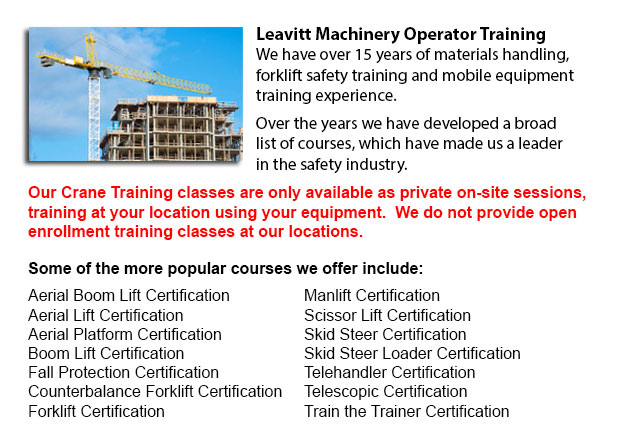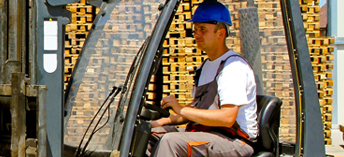
Ontario Crane Training Courses - The heavy machinery crane is designed to lift, lower and move heavy supplies. Typically, the crane comes equipped together with a hoist, sheaves, and wire ropes or chains. Cranes are utilized in the businesses of transport, manufacturing and construction. These machinery help with the movement of materials, loading and unloading of freight, and the assembling of heavy machines.
Cranes come in many different types. Each and every kind of crane is designed for a specific purpose. Jib cranes are the smallest type, meant for indoor use. Tower cranes are the tallest kind, utilized for constructing buildings. Mini-cranes are used to be ale to access tight spaces. Floating cranes are utilized salvaging operations and oil rig construction on water.
Crane operating procedure will be reviewed daily in the crane training course session. The implementation of correct overhead material handling measures is included in the course. Proper training means longer equipment lifespan and less maintenance expenses. The course instructs participants in operating and inspection procedures focused on all operational factors, like for instance proper slinging and rigging. Those participating could deal with essential crane components to know the mechanical parts. Lifting practices will be shown along with recommended methods for review by your safety committee. Sessions will include demonstration videos. The crane training course consists of a reference and resource handbook.
Course content consists of machinery terminology; codes pertaining to overhead cranes, attachments and hoists; proper inspection methods; essential maintenance requirements and procedures; right sling use.
Equipment Covered: All Types of Below-the-Hook Devices; All Kinds of Slings; Lever Hoists Hand Chain Hoists; Electric Chain and Wire Rope Hoists; Light railed and patented cranes; Jib Cranes; Standard overhead Cranes; Cab Operated Cranes; Radio Controlled Applications; Hot Metal Applications and Magnet Applications.
Ask about our customized training, such as electric chain hoists for theatres; rigging training for a refresher, bilingual training in dangerous surroundings; high lifts; pedestal, jib and gantry cranes.
-
Ontario Manlift Certification
Ontario Manlift Certification - The Elevated Platforms and Manlifts Certification course helps to provide the required training on the work practices, safe operating procedures, regulations and rules regarding the everyday activities for the operator... More -
Ontario Crane Training
Ontario Crane Training - Bridge cranes or overhead cranes are actually a type of industrial material handling crane making use of a line and hook mechanism that runs on a horizontal beam running along two widely separated rails. Various overhead cran... More -
Ontario Aerial Lift Train the Trainer
Ontario Aerial Lift Train the Trainer - The Aerial Lifts Train the Trainer Certification Program teaches trainers how to effectively train operators in safe industrial mobile machinery operation. Trainers are given in-depth instruction about aerial l... More -
Ontario Warehouse Forklift Training Classes
Ontario Warehouse Forklift Training Classes - The reason for warehouse training classes are to raise the awareness of common workplace dangers. The trainees will learn essential warehouse safety procedures. An emphasis is placed on paying attention t... More -
Ontario Forklift Training School
Ontario Forklift Training School - Forklift Training School - Industry and federal regulators have established the criteria for forklift safety training based on their current standards and regulations. Those wanting to operate a forklift must finish... More -
Skid Steer Loader Training in Ontario
The engine powered skid-steer loader consists of a rigid and small frame, equipped along with lift arms that could attach to lots of industrial tools and attachments to execute many labor saving jobs. Normally, skid-steer loaders are four-wheel drive... More -
Ontario Crane License
Ontario Crane License - Crane operators ought to be "credentialed", that means they ought to own a crane operator certification or license. Credentialing is considered a mandatory governmental requirement to be able to practice as an operator of a cr... More -
Ontario Forklift Operator Training
Ontario Forklift Operator Training - Forklift training is a prerequisite in North America and is intended to prevent workplace injuries and death. Forklift training offers driver training intended for forklift operators. Training programs teach the s... More

Forklift Certification Ontario
TOLL FREE: 1-888-254-6157
Toronto, Ontario
forkliftcertificationontario.com
Email Us
About Us


